North Carolina War Between the States Sesquicentennial
Northern Sectionalism and Motivation for War
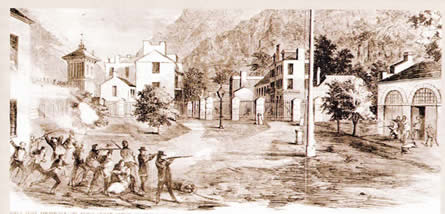
Northernizing the South
“By the fall of 1856, some members of the Massachusetts aid committee, concluding that
private support for the Kansas free-State settlers was not sufficient to protect them from proslavery
advocates there, were urging northern State governments to intervene in the territory.
[Amos Lawrence] consulted with some of his conservative friends about the idea and was told
the State of Massachusetts had no constitutional authority to act in Kansas affairs.
Lawrence admitted that such an action could then only be justified upon "higher law" ground.
The concept of higher law was one abolitionists were fond of invoking, and Lawrence confessed that
it was a concept "which I never believed tenable, except for extreme cases, which come up once in a lifetime."
[Lawrence] told Samuel Gridley Howe that he deemed the denial of honest elections in Kansas to be
"a sufficient cause for revolution." Lawrence hoped to avoid civil war in the territory, but if it came to
that, he predicted, "it will be a contest between liberty and slavery, and it cannot last long for the slaves
will not wait for its termination." Instead, they would revolt and the uprising would spread
into neighboring Missouri, toppling slavery there.
The leaders of the [New England Emigrant Aid] company made every effort to divorce themselve’s
from the abolitionist camp. Rather than emphasize the evils of slavery for the slave, most of the men
active in the [company] stressed the threat of slavery to northern values and institutions . . .
New Englanders believed that the very future of republican government was at stake in Kansas and,
furthermore, the nation. Thus for them, Kansas became battleground between
New England and Southern ways of life.
Eli Thayer, who founded the company, shared in this New England sense of mission. He hoped to
keep the Emigrant Aid Company alive and to use it to promote free-labor colonies north and south
of Kansas. By 1858, he was even proposing to "New Englandize" Central America...
"we [will] send steam engines sir, which are the greatest apostles of liberty that this country has ever seen."
[At] . . . the company's annual meeting in 1856 he raised the possibility of colonizing Virginia . . .
and in 1857 settled some northerners in western Virginia, near the Ohio River. By such means,
Thayer proposed to "Northernize the South."
(Lawrence)...preferred to secure the western territories for freedom and let the superiority of the
northern economic system eventually transform the South. Until then, the Southerners should
be left alone to bear responsibility for owning slaves;
"it is not for us who imported their ancestors to complain."
(Cotton and Capital, Boston Businessmen and Anti-Slavery Reform, Abbott, UMass Press, pp. 42-47)
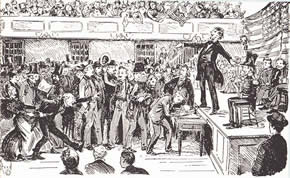
Exterminate the White People of the South
“[Many] corrupt [Northern] leaders sought means to give vent to hatreds that had been aroused
by the war. William G. Brownlow, better known as “Parson Brownlow,” a preacher who became
Governor of Tennessee during the Reconstruction era, had declared in
a speech to a convention in New York in 1862:
“If I had the power, I would arm every wolf, panther, catamount and bear in the mountains of America,
every crocodile in the swamps of Florida, every Negro in the South, every fiend in hell, clothe them
all in the uniforms of the Federal army and turn them loose on the rebels of the South and exterminate
every man, woman and child south of the Mason Dixon line. I would like to see especially the Negro
troops, marching under Ben Butler, crowd the last rebel into the Gulf of Mexico and drown them
as the Devil did the hogs in the Sea of Galilee.”
(Fire from the Flint, Cook, John F. Blair, Publisher, 1968, pg 13)
New England abolitionists emerged from amongst those who had butchered or sold into West Indian
slavery the Pequot tribe and enriched themselves in the African slave trade; yet lectured the South
on morality and the evils of involuntary servitude. Southerners logically saw no future in a fraternal Union
with such people, departed in the respected Jeffersonian manner, confident that they would discover the
solution to African slavery in their own time as the North had done earlier.
Abolitionist Hate Sows the Seed of War:
“As with the anti-liquor and anti-foreign movements [in the North], emotion was the basic quality of the
renewed anti-slavery drive. While each of the three had social and economic background, especially
this was true of the anti-slavery crusade.
This renewal of the anti-slavery campaign did not, however, represent a belated Abolition triumph.
From the time of the Nat Turner insurrection, the Abolitionists’ chief effect upon the North had been
to excite distaste and opposition, while in the South they had aroused a frenzy of resentment and fear
.
While William Lloyd Garrison’s imprisonment in Baltimore gave satisfaction in Philadelphia, New York
and Boston, as well as in Richmond, Charleston and Mobile. When William Lloyd Garrison denounced
the Constitution as “a covenant with death and an agreement with hell,” great Northern groups were
horror-struck. Attempts to give political instrumentation to Abolition policies became increasingly
ineffective, and after 1840, the word came to be used to represent a demand for solution
of the slave problem by other than political means.
Examination of Abolition speeches, sermons, pamphlets and books during these ‘Thirties and ‘Forties
affords a ready understanding of these reactions. For, in the deep black of Southern turpitude the
Abolitionists could see no good, no redeeming trait, no shade of gray. The formula of attack was
almost standard: The Negro was God’s image in ebony. White and black were brothers, equals,
and slavery was a sin against God. The Declaration of Independence asserted that all men were
created equal, and so slavery was a breach of the Declaration as well as an affront to Almighty God.
There could be no honest slave-holder, the Abolitionist insisted, all such were thieves, robbers and man-stealers.
The slave-holder underfed his chattels, housed them in hovels and punished them like wild animals. Tales of
savage cruelty and bestial lust were eagerly repeated. Abolitionist lecturers went into every hamlet of
the North painting tales of unmentionable horrors of the South. The entire Southern social system was
indicted along with slavery. All Southern white men were portrayed as lazy, drunken, lustful braggarts.
Their society was an oligarchy, a slavocracy destructive of American democracy.”
(The Eve of Conflict, George Fort Milton, Houghton Mifflin, pp. 160-161)
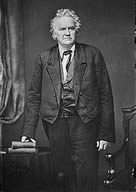
Joshua R. Giddings was outspoken against the Mexican War, but later silent on
a president outraging the Constitution and exercising usurped powers to do so. The Confederate States,
an American republic formed with the consent of the governed, was at peace with the United States
when Giddings government provoked a war of aggression and conquest. As his government was
undergoing a revolution, his words below were not unlike Southern Unionists in early 1861.
This Curse Upon Our Nation:
“Joshua Giddings, a strongly abolitionist antiwar Whig from Ohio who had earned a reputation
as a leading reformer in the House [of Representatives], made the most telling speech against the [Mexican] war.
“I regard it as having been put forth to divert public attention from the outrage committed by the President
upon our own Constitution, and the exercise of usurped powers, of which he had been guilty in ordering
our army to invade a country with which we are at peace, and of provoking and bringing on this war….
It is a war of aggression and conquest. Its prosecution will be but an increase of our national guilt.
The death of every victim who falls during its progress, will add to the already fearful responsibility
of those, who, from ambitious motives, have brought this curse upon our nation….But, Sir, I regard
this war as but one scene in the drama now being enacted by this administration. Our government
is undergoing a revolution no less marked than was that of France in 1792.
As yet, it has not been characterized by that amount of bloodshed and cruelty which distinguished
the change of government in France. When the Executive and Congress openly and avowedly
took upon themselves….the total overthrow of and subversion of the Constitution, and that too,
by the aid of northern votes, my confidence in the stability of our institutions was shaken, destroyed.
I had hoped….to save the Union form final overthrow, but that hope has been torn from me.”
(Conquest and Conscience in the 1840s, Robert Sobel, Thomas Crowell Company, 1971, pp. 253-254)

It was clear by the late 1850’s, perhaps even earlier, that two countries were living
within the boundaries of the United States.
Covert Hostility Toward the South
“Various expressions in Northern papers, debates in Congress, and events in Kansas and
elsewhere had fanned these flames [of war] when the stroke of John Brown fell upon Harper’s Ferry.
This event was taken as a demonstration that abolitionists had lied in saying that they were concerned
with moral suasion only, and it stimulated suspicion that Republicans were abolitionists in disguise.
In February [1860] the Alabama legislature asserted that under no circumstances would the
commonwealth submit to the “foul domination of a sectional Northern party,” and it instructed
the governor in the event of a Republican’s election to the Presidency to order the election of delegates
to a convention of the State to consider and do whatever in its judgment
her rights, interest, and honor might require.
In an editorial of January 9, 1860, on “The True Position of the South: Not Aggrandizement
But Safety,” the New Orleans Crescent, which was long an advocate of moderation, said:
“The South does not claim the right of controlling the North in the choice of a President;
she admits fully and explicitly that the Northern people possess the prerogative of voting
as they please. But at the same time the South asserts that while the North holds the legal
right of casting her voice as to her may seem best, she has no moral right to so cast it,
in full view of its injurious effects upon us,…she, in effect, commits an act of covert hostility
upon us that will render it impossible for us to live longer in harmonious relations.”
(The Central Theme of Southern History, Phillips, Heath and Company, 1949, page 22
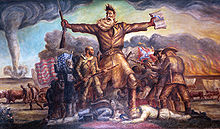
John Brown carried one of “Beecher’s Bibles” at Harper’s Ferry, provided by a man greatly
responsible for the war that ended the republic. Upon Beauregard’s demand for the surrender
of Fort Sumter in April 1861 Beecher was to proclaim:
“I utterly abhor peace . . . Give me war redder than blood and fiercer than fire.” The abolitionists
would offer no practical and peaceful solution to slavery, only war to the knife and a million dead.
Preaching the Everlasting Shell Game
“Henry Ward Beecher, the most popular preacher in America, famous for his spellbinding crusades
against slavery, liquor, the secret vice and every other evil, committed adultery with at least one
woman of his congregation, a woman who happened also to be a Sunday School teacher and
the wife of an admiring protégé of Beecher’s.
The offense itself is not so revealing as the spirit of callous exploitation with which it was carried out
and the deceit and hypocrisy with which it was covered up. Beecher was warmly defended by the
establishment of his day. Most of the press declared his innocence and his parishioners raised
$100,000 for his legal expenses, while those who brought the charges that we
now know to be true were hounded.
The powers that be, then as now, rush to the rescue when their most valuable asset, their pretense
of superior moral vision, is threatened. Henry’s deceit in this episode was not merely a weakness
displayed on one painful occasion. It was a way of life to a man whose fame and riches were
built on a conveniently abstract, unscrupulously-aggressive, politically irresponsible moralizing.
In his memoirs, for example, Henry lied about so simple a thing as a college debate. He recounted an
occasion in which he had carried the house against a proposal for the colonization of blacks outside
the United States. In fact, he had not participated in the debate in question and the pro-colonization
side had won. Characteristically, he had falsely glorified his own role and distorted the historical
record to make his antislavery stand date to a much earlier and more dangerous period than it actually did.
The story of the Beecher’s is that of people who proclaimed themselves the champions of freedom
and morality and demonized those who disagreed, while all the time keeping their hand in the till and
their eye on the main chance. The chief lesson we can learn is that there is something in the American
fabric that guarantees that now and then such people will succeed outrageously.
Today’s secular liberals will, of course, dismiss Henry Ward Beecher as simply a typical hypocritical
Protestant moralist. Yet he was one of them. He was a leading liberal of his day, a crusader not for
souls but for political and social reform. He was an establishment figure, not a small-town vigilante.
He spoke from a position of power and respectability from which he safely and irresponsibly rode to
the outer limits every fad of his day.
Beecher is not the father of the Moral Majority; he is the father of the smug establishment figures
who juggle morality and sybaritic life-styles in an everlasting shell game.
That strange combination of Puritanism and democracy which wreaked so much havoc in the 19th century,
having done its work and reached the natural limits of its expansion, began a retreat into narrower and less
dangerous limits after the debacle of Reconstruction. Something very similar is perhaps happening now.
If so, we can hope once again for leaders for whom public life, as for Lee, is an arena for the exercise
of private virtue rather than, as for the Beechers, a vehicle for the social mobilization
of private greed and discontent.” (1982)
(The Enemy Up Close, book review of The Beecher’s, Milton Rugoff, 1981; Clyde N. Wilson,
Defending Dixie, Essays in Southern History and Culture, FAE Press, 2006, excerpt, pp. 209-210)
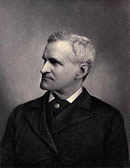
Frances Parkman was a militant New England war hawk who disliked the black man but
considered the Boston aristocracy superior to the Southern leadership, though it must emulate the
military expertise exhibited by Southern men. The Brahmin class may have indeed been tested by the
battles Parkman lists, but they were no great victories. At Ball’s Bluff, Northern scouts mistook
a row of trees as Confederate tents, and the 17th Mississippi delivered the Brahmins a severe thrashing
when their regiments later assaulted the mis-identified encampment.
The Brahmin Aristocracy Will Save the Union:
“Parkman had always detested the abolitionists, and he lad little concern for the Negro, but he
was [Robert Gould] Shaw’s cousin, and he took great pride in later years pointing this out to distant
correspondents. One suspects, however, that he was almost ashamed that Shaw led Negroes
[of the 54th Massachusetts], since he never mentioned this fact.
[In] two letters [of November 1862], he further developed the odd propaganda line that the best way
to whip the South was to emulate certain aspects of its civilization. He went from praising the
military education of the Southern aristocrat to praising his political education. Compared to the North,
where an “organized scramble of mean men for petty spoils” had driven the better elements from
politics, the South had made politics “a battleground” for the well-born, “where passion, self-interest,
self-preservation, urge to [the most intense] action every power of their nature.”
This explained “the vigor of their development.”
By comparison, the education of Northern gentlemen had been too academic. Now, however,
the war was altering the picture. The South, which had identified the North with three classes:
the merchants, the politicians and the “abolitionist agitators” and therefore, with “extravagance,
fanaticism and obstreperous weakness,” was learning how, “under a surface of froth and scum,
the great national heart still beat with the pulsations of patriotic manhood.” In other words, they
underestimated the ability of the Northern gentry to adapt to military life.
It was in his letter of July 21, 1863, published only three days after the death of [Col. Robert G.] Shaw,
that Parkman revealed most fully what was really on his mind. Repeating his charge that
“the culture of the nation” had become a “political nullity,” Parkman referred specifically to the
“Brahmin cast”, which had “yielded a progeny of gentlemen and scholars since the days of
the Puritans,” but had “long since ceased to play any active part in the dusty arena of political turmoil.”
This class, however, had at last found an outlet for its energies. Brahmins had been tested in battle
at places like Ball’s Bluff, Antietam, Fredericksburg, and Gettysburg and removed all doubts about
their vigor and character. Pointing to the “necrology” of Harvard University” as an example to the
nation, Parkman clearly suggested that the American people had no further excuse for rejecting
the political and social authority of what was now a tried and true aristocracy. Perhaps a
patrician could finally say that the age of “ultra-democratic fallacies” was coming to an end.
There were very genteel New Englanders who professed to see the war as a vindication of democracy
and egalitarianism. Charles Eliot Norton and others claimed that their wavering belief in democracy
had been revived by the proofs of obedience and endurance shown by the common people
and by the Negroes in the struggle.
It depended on the preservation of the model which had been suggested by the assault on Fort Wagner.
If the “inferior elements,” whether Negro or white, consented to be led by “the best culture
[of aristocratic New England],” then their rights were assured; if however, they struck out in
directions of their own, democracy and equality might again be questioned.”
(The Inner Civil War, Frederickson, Harper & Row, pp. 161-165)

Cotton and Capital, Boston Businessmen and Anti-Slavery Reform, Richard H. Abbott, UMass Press, 1991
Fire from the Flint, The Amazing Careers of Thomas Dixon, Raymond Allen Cook, John F. Blair, Publisher, 1968
Defending Dixie, Essays in Southern History and Culture, FAE Press, 2006
The Eve of Conflict, George Fort Milton, Houghton Mifflin Company, 1934
The Inner Civil War, Northern Intellectuals and the Crisis of the Union, George M. Frederickson, Harper & Row, 1965
The Central Theme of Southern History, Ulrich B. Phillips, DC Heath and Company, 1949
Copyright 2013, North Carolina War Between the States Sesquicentennial Commission